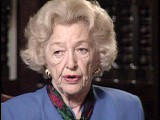You searched for: London%20College%20of%20FashionDiploma%20in%20Public%20Administration%E3%80%90%E4%BB%BF%E8%AF%81%E5%BE%AECXFK69%E3%80%9172PuU
<< Previous | Displaying results 141-150 of 188 for "London%20College%20of%20FashionDiploma%20in%20Public%20Administration%E3%80%90%E4%BB%BF%E8%AF%81%E5%BE%AECXFK69%E3%80%9172PuU" | Next >>
-
Gabrielle Weidner
ID CardGabrielle was the second of four children born to Dutch parents. Her father was a minister in the Seventh-Day Adventist Church. She grew up in Collonges, France, near the Swiss border, where her father served as a pastor. Gabrielle was baptized in the Seventh-Day Adventist faith at the age of 16. She attended secondary school in London, England. 1933-39: Gabrielle became increasingly active in the Seventh-Day Adventist Church, eventually becoming the secretary at the French-Belgian Union of Seventh-Day…
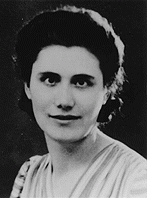
-
Germans bomb Coventry
FilmOn the night of November 14-15, 1940, almost 500 German bombers attacked the British industrial city of Coventry in central England. The bombers dropped 150,000 incendiary bombs and more than 500 tons of high explosives. The air raid destroyed much of the city center, including 12 armament factories and the historic Saint Michael's Cathedral. This footage shows scenes from the aftermath of the attack. The bombing of Coventry came to symbolize, to Britain, the ruthlessness of modern air warfare.
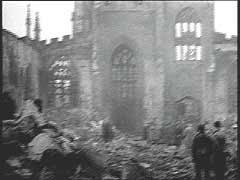
-
Allies evacuate troops from Dunkirk
FilmThe German western campaign in May 1940 decisively defeated the British and French forces arrayed against it. By the end of May, the Allies began the withdrawal of British and French forces from the Continent to prevent their surrender or destruction. The evacuation effort centered on the French coastal town of Dunkirk. As German forces completed their conquest of France, more than 1,000 vessels--including small civilian yachts and fishing boats--ferried Allied forces across the English Channel to Great…
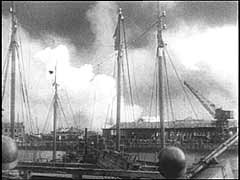
-
Dorotka (Dora) Goldstein Roth describes conditions in the Vilna ghetto
Oral HistoryAfter the Germans invaded Poland in 1939, Dora's family fled to Vilna, Lithuania. When the Germans occupied Vilna, Dora's father was shot and the rest of the family was confined in the Vilna ghetto. Dora, her sister, and her mother were deported to the Kaiserwald camp in Latvia and then to the Stutthof concentration camp near Danzig. Her mother and sister perished in Stutthof. Dora herself was shot immediately before liberation, but she survived.

-
Sophie Turner-Zaretsky describes feeling different from other Polish children
Oral HistorySophie was born Selma Schwarzwald to parents Daniel and Laura in the industrial city of Lvov, two years before Germany invaded Poland. Daniel was a successful businessman who exported timber and Laura had studied economics. The Germans occupied Lvov in 1941. After her father's disappearance on her fifth birthday in 1941, Sophie and her mother procured false names and papers and moved to a small town called Busko-Zdroj. They became practicing Catholics to hide their identities. Sophie gradually forgot that…

-
Sophie Turner-Zaretsky describes living conditions while in hiding in Poland
Oral HistorySophie was born Selma Schwarzwald to parents Daniel and Laura in the industrial city of Lvov, two years before Germany invaded Poland. Daniel was a successful businessman who exported timber and Laura had studied economics. The Germans occupied Lvov in 1941. After her father's disappearance on her fifth birthday in 1941, Sophie and her mother procured false names and papers and moved to a small town called Busko-Zdroj. They became practicing Catholics to hide their identities. Sophie gradually forgot that…
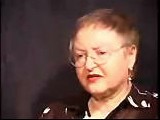
-
Sophie Turner-Zaretsky describes how her teddy bear was given his name
Oral HistorySophie was born Selma Schwarzwald to parents Daniel and Laura in the industrial city of Lvov, two years before Germany invaded Poland. Daniel was a successful businessman who exported timber and Laura had studied economics. The Germans occupied Lvov in 1941. After her father's disappearance on her fifth birthday in 1941, Sophie and her mother procured false names and papers and moved to a small town called Busko-Zdroj. They became practicing Catholics to hide their identities. Sophie gradually forgot that…
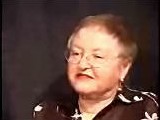
-
Sophie Turner-Zaretsky describes what she would like people to think about when they see her teddy bear
Oral HistorySophie was born Selma Schwarzwald to parents Daniel and Laura in the industrial city of Lvov, two years before Germany invaded Poland. Daniel was a successful businessman who exported timber and Laura had studied economics. The Germans occupied Lvov in 1941. After her father's disappearance on her fifth birthday in 1941, Sophie and her mother procured false names and papers and moved to a small town called Busko-Zdroj. They became practicing Catholics to hide their identities. Sophie gradually forgot that…
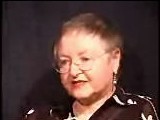
-
Belle Mayer Zeck describes the impact of the Nuremberg trials on her
Oral HistoryBelle Mayer trained as a lawyer and worked for the General Counsel of the US Treasury, Foreign Funds Control Bureau. This bureau worked to enforce the Trading With the Enemy Act passed by Congress. In this capacity, Mayer became familiar with the German I. G. Farben chemical company, a large conglomerate that used slave labor during World War II. In 1945, Mayer was sent as a Department of Treasury representative to the postwar London Conference. She was present as representatives from the Allied nations…
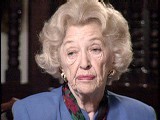
-
Belle Mayer Zeck describes the emotional toll of the Nuremberg trials
Oral HistoryBelle Mayer trained as a lawyer and worked for the General Counsel of the US Treasury, Foreign Funds Control Bureau. This bureau worked to enforce the Trading With the Enemy Act passed by Congress. In this capacity, Mayer became familiar with the German I. G. Farben chemical company, a large conglomerate that used forced labor during World War II. In 1945, Mayer was sent as a Department of Treasury representative to the postwar London Conference. She was present as representatives from the Allied nations…
